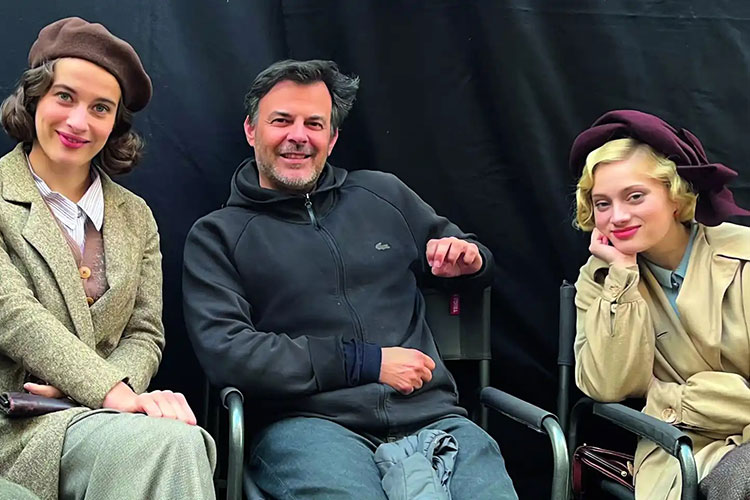This past Friday it was released in theaters “My Crime”the new film by the French filmmaker Francois Ozon. We chatted with him in the framework of the BCN Film Festival to find out more about this comedy on a subject as thorny as the abuse of power.
He frowns when I tell him that he can be described as the French Woody Allen. The reason for the affirmation is the annual regularity with which Francois Ozon premieres a new film, as has been the case with the New York director for several decades. Ozon defines Allen as “a great filmmaker” whom he admires “enormously”. However, the reaction to my comparison, made without double intention, implies that this had not been the most accurate, especially since minutes before I had brought up the abuse controversy surrounding Allen and the fact that the new tape of the author of “Annie Hall” It was a French production that, moreover, the Cannes festival did not want to screen in its next edition (which will take place this month). “Hard for me to talk about it”he had replied.
“I find it interesting to be able to laugh at very serious topics”
He does talk about sexual harassment in his new movie, “My Crime”, which inaugurated the recent BCN Film Festival -framework of the interview- and which is being released now. In fact, the attempted rape of a young actress is the starting point of this comedy performed by Nadia Terszkiewicz and Rebecca Marder about two young friends in Paris in 1934. Sorry, did I use ‘comedy’ and ‘in the same sentence? attempted rape’? Is it possible to make a comedy with that?
“Temporal distance allows comedy to be used”says the director. “If the action of the film happened in the present day, I would be forced to make a dramatic film. The film Tár, which is not exactly the same, but speaks of the abuse of power, is a dramatic film. I find it interesting to be able to laugh at very serious topics. This makes it possible to get the message across better, to reflect and to distance oneself. The Me Too happened a few years ago, we have understood things, people evolve, society is transformed and the medium of cinema has understood a lot about abuse. I think we can talk about it laughing now.”he concludes.
Ozon is a director used to serious issues. His latest films have addressed issues such as euthanasia (“Everything went well“), the sexual abuse of children by priests (“Thank God”) or youth prostitution (“Young and pretty”). Returning to comedy was for him “a need to return to levity after more dramatic arguments” and precise: “My crime came after the confinement and the pandemic and I felt, as a spectator, but also as a filmmaker, the desire to go for something that produced pleasure”. Ozon connects, from an afterthought, “My Crime” with his other two comedies: “8 women”, who would talk about the crisis of patriarchy, “Potiche”which would do so from the advent of matriarchy, until reaching the triumph of sisterhood with “My Crime”. (This relationship was exposed in the press conference of the film at the BCN Film Festival).
Thus, his filmography abounds, as happens in “My crime”, the female characters: “They are more interesting because women are more victims in life. There is more interest in following characters who are struggling, who are trying to find their place. Here are two young men in the thirties, in a patriarchal society where women are not very happy.”reveals.
“My Crime” it is based on a 1934 play by two French authors, which he has extensively modified: “The work is completely forgotten. I came across it because I realized that it had been adapted in the 1930s in the United States in a film called “True Confession”. Look at her, she’s mediocre -warns me-, but it’s fun to see what the Americans did with a French piece. The work was appropriate to the misogynist context of the time. I have made it more feminine and feminist, I have transformed characters and I have cut things. I have done what I wanted, but I have kept the idea of the false culprit. That was what interested me.” affirms in allusion to the fact that one of the protagonists confesses to having committed a crime of which, in reality, she is innocent.
A subtle feminist sample of the film is the mention of Alice Guy, a pioneer of French cinema whose figure has been vindicated in recent years: “It was a name that was known, but not too well. A few years ago a documentary was released in France and it became known about its importance in the history of cinema. We must do a job of historical recovery of the work of women artists. We are in a patriarchal society and it is important to shed light on them again”, claim. And he adds: “But all those silent film people had tragic fates, including Méliès. Not everyone who invented so many things in the silent world managed to make the transition to sound, like… Odettte Chaumette”. Ozon refers, in an amusing way, to the fictional character (inspired by Sarah Bernhardt) played by Isabelle Huppert in the film, an actress always associated with dark and uncomfortable characters (“Elle”, “The Pianist”), but who he always turns to for comedies -first, “8 women”, and now, “My Crime”-: “She doesn’t like that I only cast her in comedies. She would like to do a drama with me. She makes me laugh and she’s so good at doing drama that I don’t want her to do the same.”confess.
